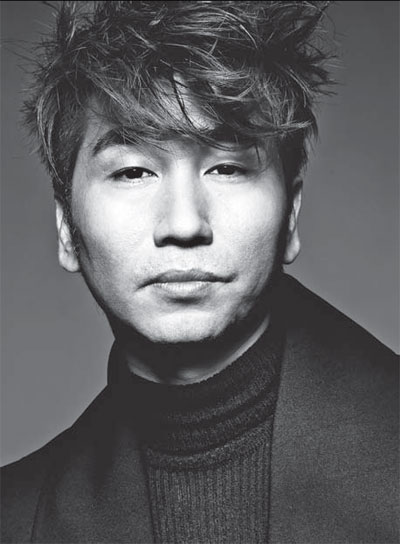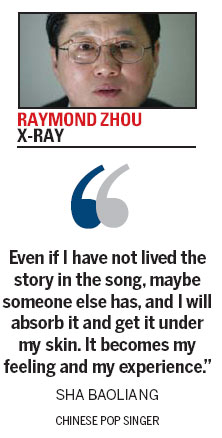The ones he loves
Updated: 2011-11-11 13:16
By Raymond Zhou (China Daily)
|
|||||||||
 |
|
Pop singer Sha Baoliang believes his singing resonates more with "those with a storied past". Provided to China Daily |
China's prince of love ballads uses music as a life-affirming experience from which both he and his fans derive a new appreciation for emotional honesty.
Sha Baoliang has a special affinity for the Arabic numeral 1. He was born on Jan 1 (or 1-1 in Chinese notation) and has chosen Nov 11 (11-11) for his solo concert at Beijing's MasterCard Center, formerly the Wukesong Arena. "The numeral 1 means a new start," the pop singer says. "Nov 11 is China's Guanggun Festival - the day for single men. To me, it is more romantic than Valentine's Day. Many bachelors get their marriage licenses on this day." Sha is famous for love ballads. His breakout hit depicts "petals moving away from a floral axis yet leaving behind a dark fragrance". This time, he wants his fans to "believe in love and say goodbye to bachelorhood".
To highlight the theme, he has collected several love stories from which he'll pick, and he'll be the witness for those who dare to profess their love on stage.
"It'll be a romantic night," he promises.
|
 |
If his love songs have a tinge of fatalism, they fit his voice perfectly. Like "the dark fragrance", he is able to project a lingering melancholy that comes with sometimes not-too-happy endings.
Sha recounts a tale that happened to one of his friends.
"He" died in a traffic accident. Unbeknownst to his family and friends, "he" had a mistress, and "she" attended his funeral. Afterwards, "she" committed suicide, leaving a note that said, "I could not appear with you while you were alive, and now that you're gone I'll make my final statement in a public way".
Sha says he does not judge the affair on moral grounds.
"It was a kind of love that transcended everything. There is no right or wrong in this."
The 39-year-old believes that his singing resonates more with people of his own age group, "those with a storied past", and those who have followed him from the beginning of his career.
"Younger audiences tend to like music that's more upbeat while my followers usually have lived more and can find a reflection of that experience in my music," the regular chart-topper says.
The prince of love songs treats each number as if it were about him personally.
"Even if I have not lived the story in the song, maybe someone else has, and I will absorb it and get it under my skin. It becomes my feeling and my experience. If I have to play-act, it would be like two skins that cannot congeal into one."
This kind of total immersion prepared him well for his plunge into a side career in musicals.
When Sanbao, the famous composer, was rehearsing for Butterfly, he asked Sha to do a demo but never thought of giving Sha the role.
"It would require half a year of commitment and mean a big financial loss to anyone of Sha's stature, who could easily have made more money elsewhere," Sanbao says.
But Sha didn't hesitate to take on the challenge.
Previously, he was a last-minute replacement for Sanbao's other musical Jinsha.
In China, marquee-name stars rarely appear in musicals because of the long rehearsal time, high technical demands and low financial payoff.
But Sha believes the reward was much bigger than most people calculate.
"It was another experience and another lifestyle," he says.
"It enriched me. I had been interpreting each of my songs as a mini-musical. Although I have not received stage training, once I'm into my music, I feel I can get where I want. I act with my music."
Sha did have plenty of stage experience, though.
He is referring to a deficiency in dramatic roles.
As a young adolescent, he was trained in acrobatics and got an international award for it. Later, he dabbled in street dancing.
What he always wanted, however, was music. The reward he asked his parents for after winning kudos in acrobatics was a guitar.
For much of the 1990s, the Beijing native sang in bars and danced for pop stars.
He listened to a rich variety of music and experimented with many genres.
The collaboration with Sanbao opened up a new vista for him.
"The hint of classical elements in Sanbao's music brought out the best in me, and my voice suits it to a tee," Sha says.
"His works also inspire me, and give me plenty of room for creativity in performing this kind of music."
The new album, Love Song 2012, is Sha's eighth in a decade, this in an age when the recording industry has been losing ground and the CD album is declared dead.
But for Sha, listening to music is something of a ritual. He enjoys the process of taking the shrink-wrap off a CD case and listening to the music while browsing the credits.
 |
He can't stand to see people blasting music from low-quality speakers while riding a bicycle. Likewise, he's turned off by the new wave of pop dilettantes who can't carry a tune.
"This is the first album in which I invested my own money," he says.
"I didn't cut any corners in any detail. People ask me why, and I said I have to respect those people who cherish quality. I'm like that, too," he continues. "A singer has to have ideals and an aesthetic standard."











